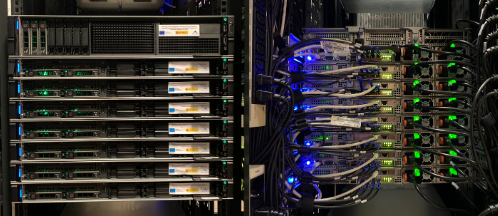ALBA Synchrotron

The IT Systems Section of the Computing & Controls Division of ALBA has started up a virtual server to process data for the folding@home international project, which is joining researchers around the world working to better understand the 2019 Coronavirus to accelerate the open science effort to develop new life-saving therapies.

A screenshot of the folding@home interface, running simulations.
Folding@home is a distributed computing project for simulating protein dynamics, including the process of protein folding and the movements of proteins implicated in a variety of diseases. It brings together citizen scientists who volunteer to run simulations of protein dynamics on their personal computers.
Since April 21st a graphic processing unit (GPU) NVidia V100 server at the ALBA Synchrotron is processing data from this international project, joining the efforts of the more than 1 million active users the platform has currently around the world.
This server, started up by the Synchrotron’s IT Systems group, is working 24 hours a day, 7 days a week. The performance of this GPU NVidia V100 card is equivalent to that of 110 central processing units (CPUs) of high-performance servers. This enables it to process the data fast and efficiently.
Understanding the virus through its proteins
In order to understand how the virus works, we have to get to know its proteins.
Proteins are molecular machines that perform many functions we associate with life. They sense the environment (e.g. in taste and smell), perform work (e.g. muscle contraction and breaking down food), and play structural roles (e.g. your hair). They are made of a linear chain of chemicals called amino acids that, in many cases, spontaneously “fold” into compact, functional structures. Much like any other machine, it is how a protein’s components are arranged and move that determine the protein’s function.
Viruses also have proteins that they use to suppress our immune systems and reproduce themselves. To help tackle coronavirus, scientists want to understand how these viral proteins work and how they can design therapeutics to stop them.
More about folding@home Covid19 research
With the collaboration of Fundación Española para la Ciencia y la Tecnología. The ALBA Synchrotron is part of the of the of UCC network from the FECYT and has received support through the FCT-20-15798 project.